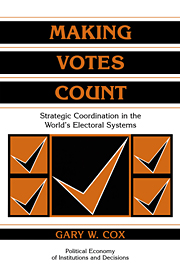Book contents
- Frontmatter
- Contents
- List of tables and figures
- Series Editors' Preface
- Preface
- PART I INTRODUCTION
- PART II STRATEGIC VOTING
- PART III STRATEGIC ENTRY
- PART IV ELECTORAL COORDINATION AT THE SYSTEM LEVEL
- PART V COORDINATION FAILURES AND DEMOCRATIC PERFORMANCE
- 12 Coordination failures and representation
- 13 Coordination failures and dominant parties
- 14 Coordination failures and realignments
- PART VI CONCLUSION
- APPENDICES
- References
- Subject Index
- Author Index
13 - Coordination failures and dominant parties
Published online by Cambridge University Press: 05 August 2012
- Frontmatter
- Contents
- List of tables and figures
- Series Editors' Preface
- Preface
- PART I INTRODUCTION
- PART II STRATEGIC VOTING
- PART III STRATEGIC ENTRY
- PART IV ELECTORAL COORDINATION AT THE SYSTEM LEVEL
- PART V COORDINATION FAILURES AND DEMOCRATIC PERFORMANCE
- 12 Coordination failures and representation
- 13 Coordination failures and dominant parties
- 14 Coordination failures and realignments
- PART VI CONCLUSION
- APPENDICES
- References
- Subject Index
- Author Index
Summary
In this chapter I continue to investigate how coordination failures affect democratic performance, this time considering the role of such failures in sustaining dominant party systems. Dominant parties are those that are uninterruptedly in government, either alone or as the senior partners of a coalition, for a long period of time (say three to five decades). Such parties are problematic for democratic theory in at least two ways.
First, are systems that support dominant parties really democratic or not? If a party is always the sole or senior party of government, then a key feature of democracy – the possibility of peaceful alternation in power – is called into doubt. Is there something in the structure of the system (whether intentionally or unintentionally contrived) that gives the dominant party an unfair electoral advantage? Would the dominant party actually step down were the electorate to vote it out?
Second, even if one believes that a particular dominant party would step down if they ever lost an election, and also believes that the electoral system is basically fair, there is still the worry that a long tenure in power may corrupt. The Italian Christian Democrats and the Japanese Liberal Democrats are two signal examples in this regard. Both parties' long reigns ended recently in part through a series of devastating disclosures about how corrupt each had become. This returns one to the question of how they continued to be elected: Do some systems facilitate corrupt but nonetheless successful politics more than others?
- Type
- Chapter
- Information
- Making Votes CountStrategic Coordination in the World's Electoral Systems, pp. 238 - 250Publisher: Cambridge University PressPrint publication year: 1997

